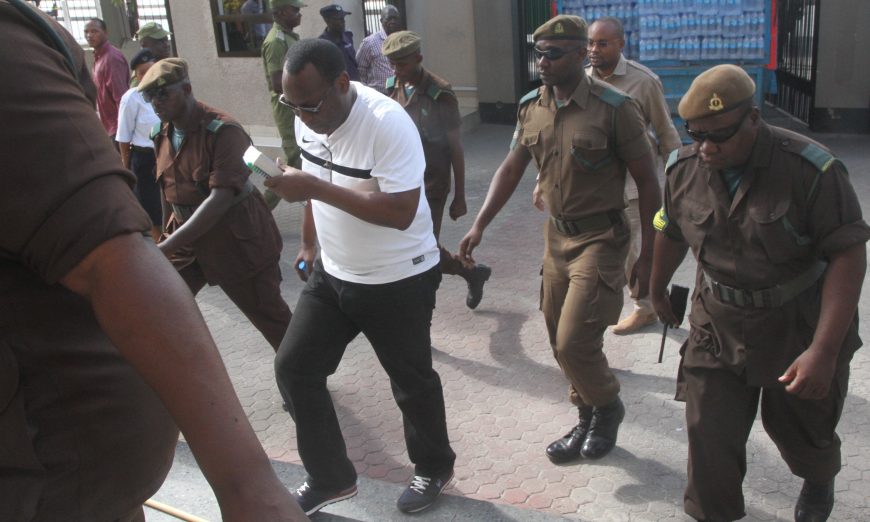“Go and counsel those that you lead or else they will end up in prison.” At a place and occasion that had nothing to do with party politics, such was an unpalatable quote from a bizarre statement by Tanzania’s President John Magufuli, on Tuesday November 27, 2018, as he addressed former Prime Minister Edward Lowassa, who was the opposition’s flag bearer in 2015.
It was a ceremony to inaugurate a university library at the University of Dar es Salaam on Tuesday November 27, 2018. Lowassa, one of the university alumni, was among high profile invitees to the occasion.
For many, the president’s jail threat to the opposition was totally uncalled for, and it was happening barely five days after the country’s leader of official opposition, Freeman Mbowe, and a Member of Parliament for Tarime Urban, Esther Matiko, had been sent to Segerea remand prison by the Kisutu Resident Magistrate’s court in Dar es Salaam.
The magistrate, Willibard Mashauri, had claimed that the duo had been behaving contrary to their bail conditions, a position challenged by their legal counsels. It is commonplace talk in Tanzania, however, given the political nature of charges against Mbowe and other top leaders of his party, that some court decisions are being “influenced from above.”
The president’s statement seems to confirm fears from a huge section of the country’s politically active population about the judiciary being influenced by the state, particularly the president – who, on many occasions, has been showing outright disregard to rule of law and independence of the judiciary.
He is instilling fear and blind obedience in every institution, including the judiciary. This explains why many news sources and whistle-blowers in Tanzania do not speak to the media unless they are assured of keeping their identities anonymous – for fear of retaliation from government agents.
One anonymous analyst told SAUTI KUBWA: “The president’s statement about the opposition ending up in jail, says a lot to the fate of rule of law in Tanzania where some magistrate’s are apt to make rulings that please him as a way of seeking favour for appointment to senior positions. This is scary!.”
Despite administrative procedures involved in appointing high court and appeal court judges, a final decision rests upon the president’s discretion.
Immediately after the courts had ruled against Mbowe and Matiko, their legal counsels filed an appeal with the High Court of Tanzania. On Wednesday November 28, 2018, a day that their appeal was to be heard, the lower court was not able to serve the High Court with proceedings leading to its earlier decision. This anomaly raised people’s eyebrows, with some of them making reference to Magufuli’s orders.
“The whole process seems to be politically influenced. This is another evidence that the magistrate had probably acted on verbal instructions from above. It defeats logic that almost a week later, the court is still fumbling to find and present proceedings of its own ruling against the defendants. It is even worse when we understand that it is the same magistrate that had refused to pull out of the case after the accused had blatantly lost confidence in him. It is likely, he is taking reprisals by abusing his authority,” a social justice activist has told SAUTI KUBWA.
Although Mbowe’s legal counsel, Peter Kibatala, has given the court a benefit of doubt, hoping nothing was done in bad faith, public opinion has it that in the current state of affairs, people’s confidence and trust in lower courts is being eroded, especially in a wave of tyrannical statements from the president.
“It was being rumoured, but now it is evident that the president is attempting to influence the judiciary especially on matters of political interest to him. The Chief Justice must come clean and make a public statement that will save the image and integrity of the judiciary,” says a lecturer from the University of Dar es Salaam.
A former deputy minister, Makongoro Mahanga, currently serving as opposition leader in Dar es Salaam, says: “This is an another evidence of our long-held position that Magufuli’s is exerting undue influence on the judiciary, by ordering some judges and magistrates to send opposition leaders to jail…”
Another anonymous activist is very brief in his comment about the president’s statement: “He is simply determined.”
Tundu Lissu has this to say: “Magufuli should learn from history that jails have never been a solution in any ruler’s bid to silence opposition. In all times and places, such rulers have never been successful!”










